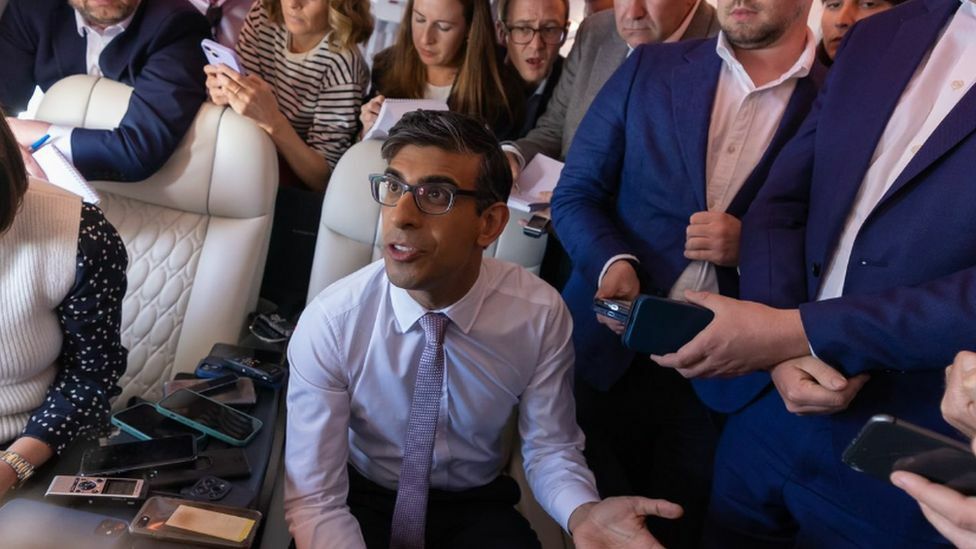Sunak to discuss Biden’s green investment and subsidy concerns in US visit

Prime Minister Rishi Sunak anticipates discussing President Joe Biden’s flagship green investment package during his visit to the United States. En route to Washington DC, Sunak remarked that “subsidy races” are not the solution to achieving climate goals. Some UK ministers have criticised Biden’s Inflation Reduction Act (IRA), which includes US$370bn (£297bn) for green technology advancement in the US, as detrimental to global trade.
The IRA aims to reduce carbon emissions by allocating billions in tax credits and subsidies to accelerate solar panel and wind turbine production and promote electric vehicle adoption. The European Union has labelled the legislation as anti-competitive. Earlier this year, Energy Secretary Grant Shapps described the package as “dangerous because it could slip into protectionism.”
Sunak is expected to meet Biden for the fourth time this year at the White House on Thursday, following meetings with business leaders and senior politicians. The prime minister’s spokesperson suggested that Sunak would also discuss green tech, the war in Ukraine, and artificial intelligence regulation during his visit.
Downing Street stated that the prime minister would aim to enhance economic security, aligning it with the level of UK-US cooperation on defence. Tensions surrounding the global implications of Biden’s economic package have risen ahead of Sunak’s first official visit to Washington DC as prime minister. The UK government has stated it has no plans to replicate the scale of the US plans, leading to accusations from Labour that the UK could fall behind in the global race to attract future industries.
During his flight to Washington, reporters asked Sunak if there was anything Biden could do to alleviate the economic impacts of his package on the UK. “It’s something that he [President Biden] and I have discussed in the past and you’d expect us to continue discussing it,” Sunak said.
When asked whether Sunak agreed with President Biden’s argument that a resilient economy sometimes necessitated a protectionist approach to key sectors, the prime minister referred to a joint statement issued by the G7 at the end of its latest summit in Japan. The statement, he said, “makes it very clear that G7 countries don’t believe in protectionism as the answer to this challenge and also don’t believe in in subsidy races that are zero sum.”
There have been reports that Sunak’s trip could result in a critical minerals pact between the two sides, allowing British carmakers exporting electric vehicles to the US to benefit from some of the tax credits offered to American firms. The US signed a similar deal with Japan earlier this year and has entered into talks with the EU.
However, progress on a broader UK-US free trade deal has stalled, with President Biden freezing talks and leaving the UK to deepen trade ties through less comprehensive mini-deals with around 20 states. Sunak also hopes to discuss artificial intelligence (AI) regulation, seeking to establish the UK as a global player in this area. The prime minister plans to host a global summit on AI regulation in the autumn and has reportedly expressed interest in the UK hosting any new international regulator for emerging technology.
The extent to which the UK can shape new global rules outside the EU remains uncertain, as the UK is now excluded from key meetings between European and American regulators, such as the Tech and Trade Council (TTC). Sunak and Biden will also discuss the war in Ukraine, which is expected to enter a decisive phase soon, with indications that a long-awaited counter-offensive from Ukrainian forces may have begun.
This follows Ukraine’s accusation that Russia is responsible for the collapse of the Kakhovka dam in Russian-held Ukraine, leading to the evacuation of thousands of people. Moscow has denied destroying the dam, instead blaming Ukrainian shelling. Speaking to reporters en route to the US, Sunak said it was “too soon” to make a “definitive judgement” on whether Russia was behind the attack, but if found responsible, it would “demonstrate the new lows that we will have seen from Russian aggression.”
Latest Thailand News
Follow The Thaiger on Google News:


























